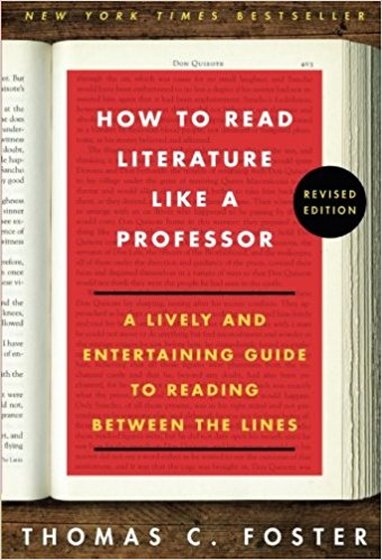MR. NICHOLAS SEVANO / SPRING VALLEY HIGH SCHOOL / LAS VEGAS, NEVADA

A thoroughly revised and updated edition of Thomas C. Foster’s classic guide—a lively and entertaining introduction to literature and literary basics, including symbols, themes and contexts, that shows you how to make your everyday reading experience more rewarding and enjoyable.
While many books can be enjoyed for their basic stories, there are often deeper literary meanings interwoven in these texts. How to Read Literature Like a Professor helps us to discover those hidden truths by looking at literature with the eyes—and the literary codes-of the ultimate professional reader, the college professor.
What does it mean when a literary hero is traveling along a dusty road? When he hands a drink to his companion? When he’s drenched in a sudden rain shower?
Ranging from major themes to literary models, narrative devices and form, Thomas C. Foster provides us with a broad overview of literature—a world where a road leads to a quest, a shared meal may signify a communion, and rain, whether cleansing or destructive, is never just a shower-and shows us how to make our reading experience more enriching, satisfying, and fun. Source: Amazon.com
PLEASE NOTE: While there will NOT be a formal assessment of this text, I still highly recommend reading it. This will add to your critical reading toolbox!
While many books can be enjoyed for their basic stories, there are often deeper literary meanings interwoven in these texts. How to Read Literature Like a Professor helps us to discover those hidden truths by looking at literature with the eyes—and the literary codes-of the ultimate professional reader, the college professor.
What does it mean when a literary hero is traveling along a dusty road? When he hands a drink to his companion? When he’s drenched in a sudden rain shower?
Ranging from major themes to literary models, narrative devices and form, Thomas C. Foster provides us with a broad overview of literature—a world where a road leads to a quest, a shared meal may signify a communion, and rain, whether cleansing or destructive, is never just a shower-and shows us how to make our reading experience more enriching, satisfying, and fun. Source: Amazon.com
PLEASE NOTE: While there will NOT be a formal assessment of this text, I still highly recommend reading it. This will add to your critical reading toolbox!
Additional Recommended Reading
As some of you have asked for summer reading recommendations, I have provided a list of titles.
Some of these texts appear on reading lists for college-bound students.
Fiction
Pride and Prejudice by Jane Austen
Don Quixote by Miguel Cervantes
Invisible Man by Ralph Ellison
As I Lay Dying by William Faulkner
The Great Gatsby by F. Scott Fitzgerald
The Scarlet Letter by Nathaniel Hawthorne
Brave New World by Aldous Huxley
Beloved by Toni Morrison
1984 by George Orwell
Frankenstein by Mary Shelly
The Death of Ivan Ilyich by Leo Tolstoy
The Adventures of Huckleberry Finn by Mark Twain
Non-Fiction
Bury My Heart at Wounded Knee by Dee Brown
Silent Spring by Rachel Carson
The Souls of Black Folk by W.E.B. Du Bois
The Outliers by Malcolm Gladwell
The Prince by Niccolò Machiavelli
Angela’s Ashes by Frank McCourt
The Republic by Plato
The Guns of August by Barbara Tuchman
Lincoln at Gettysburg: The Words That Remade America by Garry Wills
This Boy's Life by Tobias Wolff
A Room of One's Own by Virginia Woolf
Black Boy by Richard Wright
Drama
Who's Afraid of Virginia Woolf? by Edward Albee
Lysistrata by Aristophanes
A Raisin in the Sun by Lorraine Hansberry
The Crucible by Arthur Miller
Long Day's Journey Into Night by Eugene O'Neill
Hamlet by William Shakespeare
King Lear by William Shakespeare
Macbeth by William Shakespeare
Oedipus Rex by Sophocles
The Glass Menagerie by Tennessee Williams
A Streetcar Named Desire by Tennessee Williams
Fences by August Wilson
The International Baccalaureate Diploma Programme
at Spring Valley High School
To date, more than 1.2 million students worldwide have graduated from the Diploma Programme (DP). IB students reflect diverse experiences and perspectives, attend IB World Schools in 147 countries representing an even broader range of nationalities.
"During my DP courses, I was able to develop my critical thinking skills. I explored the relationship between personal superstition and the formation of scientific knowledge. This led to a deep understanding of perceptions toward scientific knowledge, source reliability, and social impact." -- Zheng "David" Zong - Shanghai, China
"I was really interested in medicine, biochemistry, neuroscience, and ecology, and being able to tailor my studies to my passions made the classes much more fun and relevant for me. These also gave me credits for some of my courses in university to accelerate my studies and meant I already had a strong background in a lot of my elective university subjects." --Samantha Nixon - St. Lucia, Australia
How's the Water?
An Inquiry into Perception, Perspective, and Persistence
David Foster Wallace
2005 Kenyon College Commencement Address
In Print as "This is Water: Some Thoughts, Delivered on a Significant Occasion,
About Living a Compassionate Life"
(1) There are these two young fish swimming along and they happen to meet an older fish swimming the other way, who nods at them and says "Morning, boys. How's the water?" And the two young fish swim on for a bit, and then eventually one of them looks over at the other and goes "What the hell is water?"
Vertical Divider
|
(15)But it will be.
|
Dive into inquiry . . .
1. What does Wallace say is the true mark of an educated person? In what ways do you reflect this? In what ways do you still strive for this?
2. What can we take from the address that speaks to abandoning assumptions and illusions and embracing a life of learning and wisdom?
3. How do our perceptions and perspectives serve as barriers and gateways to compassion?
4. How can the commencement address “This Is Water" speak to our responsibility for being globally- minded citizens?
5. In what ways do we have an obligation to persist in striving for compassion? According to Wallace, how might we go about this is our daily lives?




